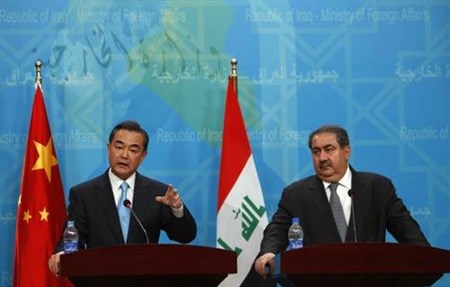Dinar Iraq News
 Beijing
pledged to pour in more investment into Iraq’s oil and infrastructure
sector, as the Chinese government stepped up its presence in the Middle
East.
Beijing
pledged to pour in more investment into Iraq’s oil and infrastructure
sector, as the Chinese government stepped up its presence in the Middle
East.
Chinese
Foreign Minister Wang Yi made the pledge on a rare visit to Iraq, a
nation sitting on the world’s fifth-largest proven oil reserves and
seeking to shore up its economy after a nearly decade-long war.
Wang
also outlined three broad points for China’s role in the war-torn
nation after discussions in Baghdad with his Iraqi counterpart, Hoshyar
Zebari, on Sunday.
He
said Chinese companies had extensive experience in giving Iraq’s energy
sector a boost, which would be a fundamental factor in Iraq’s economic
overhaul.
Moreover,
Chinese companies are willing to help Iraq create a comprehensive
development strategy for its oil sector, Wang said in a ministry
statement.
Beijing
will also participate in major Iraq projects including in electricity,
telecommunications and ports development, Wang added.
Baghdad
is seeking to raise its oil revenue – which provides around 90 per cent
of government revenue, according to economic indexes – to fund the
reconstruction of its infrastructure, which sustained heavy damage
during the conflict.
Since
the end of the war that was triggered by the 2003 US invasion and
lasted for years, Iraq has experienced sectarian violence, with bombings
by suspected terrorists occurring with alarming frequency.
Chinese
companies such as PetroChina and China National Petroleum Corporation
already have substantial investments in Iraq’s oil sector. PetroChina
has a 25 per cent stake in Iraq’s West Qurna 1 project, which is worth
billions and majority-owned by Exxon. The CNPC, meanwhile, produces
nearly two million barrels of oil a day from its projects in Iraq,
including the lucrative Rumaila and Halfaya oil fields, according to
news reports.
Iraq
deputy prime minister for energy Hussain al-Shahristani said in October
that China was seeking to increase crude sales from Iraq by more than
two-thirds to 850,000 barrels per day this year. Iraq plans to raise its
crude exports to four million barrels per day.
Asia
by far remains Iraq’s largest market, with about 60 per cent of its
crude exported to Asia, 20 per cent to American market and the rest to
Europe.
Wang
said China would uphold Iraq’s sovereignty and its fight against
terrorism, and at the same time would push for different political and
religious factions in the nation to seek reconciliation through
dialogue.
“We
believe that different factions of Iraq can be united for smooth
completion of the political task of concluding the parliamentary
election, paving a solid foundation of infrastructure reconstruction,”
Wang said, referring to elections scheduled for April.
The Iraqi government said Wang’s visit was the first by a high-ranking Chinese official since 2003.
Beijing
has recently said it desires a greater “all-around” role in the Middle
East, expanding its involvement beyond trade and energy to include
political and security affairs.
In
December, Wang called on Israel and Palestine to forge consensus on
peace and lend support for the ongoing Israeli-Palestinian peace talks.
Source: South China Morning Post
<< Back